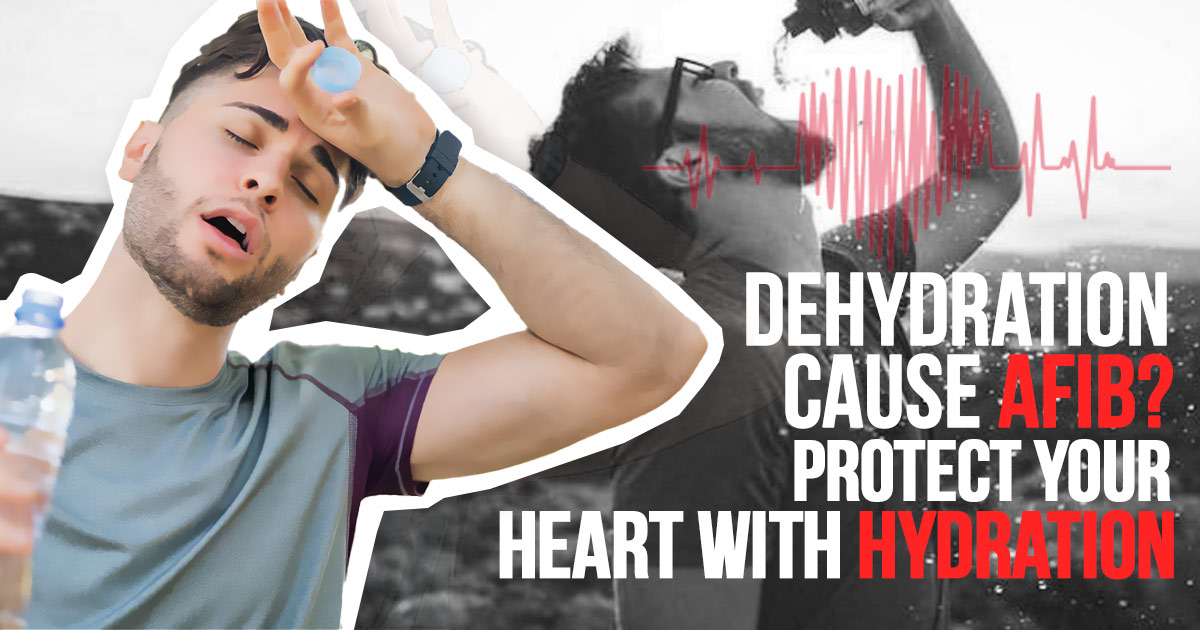Can Dehydration Cause AFib? Protect Your Heart with Hydration

We all know we’re supposed to drink water, but how often do we think about why? Sure, staying hydrated makes you feel better, but it also plays a huge role in keeping your heart healthy. A surprising fact is that dehydration can mess with your heart, increasing the risk of atrial fibrillation (AFib), an irregular and rapid heartbeat that affects millions of people.
Sounds serious, right? Don’t worry, though. We’re breaking down how dehydration can impact your heart and what you can do to stay protected.
What Happens to Your Heart When You’re Dehydrated?
When you’re dehydrated, your blood gets thicker because it’s missing the fluid it needs. Picture it like trying to suck a thick milkshake through a straw—that’s what your heart’s going through to pump your blood. This extra effort increases your heart rate (you’ve probably felt this racing heartbeat after a sweaty workout or a long day without much water).
Now, an increased heart rate is one thing, but dehydration can also lead to irregular heart rhythms. For people prone to AFib, this is especially worrying because it can trigger rapid, fluttery heartbeats that make you feel off balance or even breathless. Questions like, “Can dehydration cause irregular heartbeat?” or “Why does dehydration increase heart rate?” often come up in these situations, and the answer lies in how dehydration affects your blood and your body’s electrical signals.
Why Electrolytes Are Key for a Steady Heartbeat
Here’s something not everyone realizes about keeping your heart in check: it’s not just about water; it’s also about electrolytes. Electrolytes like potassium, sodium, and magnesium are minerals that help your heart maintain a steady rhythm. Without them, your heart’s electrical system can go haywire, leading to conditions like AFib.
Can electrolyte imbalance cause AFib? The answer is a resounding yes, it absolutely can. If you lose a lot of electrolytes—for instance, through sweating, illness, or not replenishing them after exercise—that imbalance could set you up for heart rhythm problems.
The good news is that boosting your electrolyte levels doesn’t mean choking down sugary sports drinks. There are better options, like coconut water or low-sugar electrolyte powders. The best electrolyte drinks for AFib are the ones that help replace lost minerals without adding unnecessary junk into your diet.
How Hydration Affects Your Overall Blood Flow
One thing hydration does really well? It helps your blood flow normally. When you’re hydrated, your blood stays nice and fluid, which makes it easier for your heart to pump it around your body. But when you don’t drink enough water, your blood thickens. This increases your blood pressure and forces your heart to work harder than it should.
For people already managing heart conditions, this extra strain can be dangerous. Proper hydration helps prevent these issues. If you’ve heard people ask, does drinking water lower heart rate or why does drinking water lower heart rate, it’s because water helps your heart pump more efficiently, giving it a bit of a break. Pretty cool, right?
How Much Water Is Enough for Heart Health?
If you’re like most people, you don’t count how much water you drink in a day. That’s okay, but it’s helpful to have a general idea of how much is enough. A common guideline is 64 ounces a day (about 8 cups). But everyone’s needs are different. If you’re active, live in a hot climate, or manage heart conditions, you may need more.
If you’re wondering how much water a heart patient needs to drink a day, it’s best to check with your doctor for a tailored recommendation.
An easy way to check your hydration level is by looking at your urine color (gross but useful). Pale yellow is the goal. Darker yellow means you need to drink more water, and if it’s totally clear all the time, you might be overdoing it.
Simple Ways to Stay Hydrated
Drinking enough water doesn’t have to feel like a chore. Here are a few easy tips to keep your hydration on track:
- Start Your Day with Water: Drink a glass of water right when you wake up. It’s an easy way to get ahead.
- Carry a Bottle: A reusable water bottle is a simple reminder to sip throughout the day.
- Add Flavor: If plain water feels boring, jazz it up with slices of lemon, cucumber, or mint.
- Eat Hydrating Foods: Water-rich foods like watermelon, cucumber, and celery can boost your hydration too.
- Balance Beverages: Love coffee or tea? That’s fine, but pair each cup with water to offset their diuretic effects.
Why Hydration Is a Game-Changer for AFib Risk
Dehydration might seem harmless at first, but it’s not something to take lightly when it comes to heart health. It can lead to an increased heart rate, thicker blood, and electrolyte imbalances, all of which can pave the way for heart rhythm problems like AFib.
The best part? Staying hydrated is one of the easiest lifestyle changes you can make for your health. Drinking water consistently throughout the day can reduce the workload on your heart and give you an extra layer of protection against conditions like AFib.
If you’re not in the habit yet, start small. A little more water each day can make a huge difference—not just for your heart but for your overall wellbeing. It’s a simple habit with big rewards!
